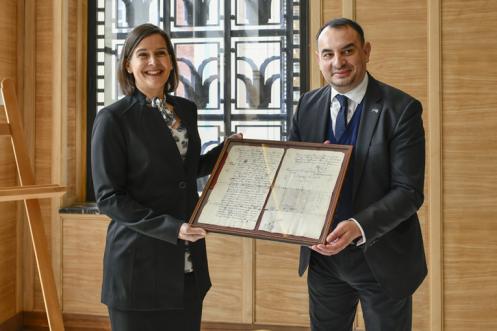
On the 600th anniversary of the creation of the Sigismund of Luxembourg Roma Decree, the House of European History received a replica of the Decree in a handover ceremony. It was presented by Tímea Junghaus, Executive Director of the European Roma Institute for Arts and Culture and Peter Pollák MEP.
The decree was an explicit order by which the monarch, King and Holy Roman Emperor Sigismund of Luxembourg, instructed officials of the kingdom, towns and military to protect the Roma groups presenting the letter from all kinds of violence. It was created in 1423 and issued to Gypsy Laszlo Voivoda and his people, in Spiš, Slovakia. The Decree was based on previous ‘letters of privilege’, most likely emanating from Hungary.
The original Decree is stored by the National Archives of Hungary. The organisation kindly provided the translation of the text further below.
The ceremony took place as part of Roma Week 2023, under the theme “reveal our past to reclaim our future”, which explores how history affects the current situation of Roma in Europe. It was followed by a solo guitar performance by Máté Palásti.
In the first of a series of speeches by representatives from the EU institutions, Peter Pollák MEP noted that Roma are the largest ethnic minority in Europe, and greater awareness and understanding of Roma history is vital, because “if we don’t know our history, we don’t know our destiny”.
Vice-President of the European Parliament Othmar Karras continued that the Decree was an early example of solidarity in Europe, and quoted Cicero in pointing out that “history is life’s teacher”.
Vice-President of the European Commission for Interinstitutional Relations Maroš Šefčovič suggested the Decree was similar to a travel document or residency permit, which allowed the holders to travel freely between European countries.
Vice President of the European Commission for Values and Transparency Věra Jourová underlined the plight of Roma at the Lety concentration camp in the South Bohemian region of Czechoslovakia during World War II. Commissioner Jourová outlined the challenges in building the forthcoming heritage site at the location of the camp, to acknowledge and commemorate the suffering and loss of the Romani people.
Lívia Járóka MEP developed this point by noting that having experienced a century of suffering, Roma should look towards a century of sunshine, highlighting the successes of public figures with Roma roots, such as the boxer Tyson Fury and footballer Zlatan Ibrahimović.
Chair of the European Parliament Committee on Culture and Education Sabine Verheyen MEP remarked that the House of European History was an appropriate place for the replica Decree to be donated due to its historical viewpoint of the continent of Europe. Romeo Franz MEP gave his opening comments in Sinte Romani, observing that there are over 200 Romani dialects in Europe.
Director of the House of European History Dr. Constanze Itzel drew on the various speeches, agreeing that currently Roma history is under-represented, and artefacts related to Roma history are hard to find in museum collections. As such, the House of European History launched a research action in 2022 with the Romane Rodimata Center for Cultural and Social Research in Romania and collaborated with researchers and organisations such as the Roma Program at the FXB Center for Health and Human Rights at Harvard University, and the Group of Women Harmed by Forced Sterilization in the Czech Republic. The focus was to acquire objects and expertise about important topics, such as the discrimination and segregation of Roma after the Second World War, as well as Roma empowerment and self-expression. As the outcome of this research, the House of European History will update its museum’s permanent exhibition in order to include more Roma history into the displays.
To sum up, Dr Itzel observed that that 15th century Decree is a positive sign of respectin European history: that some rulers and authorities in the past have been acting responsibly towards Roma people, and have taken measures to protect it. This is both an encouragement and a call to action for today.
Text translation of the Sigismund of Luxembourg Roma Decree
Sigismund, by the grace of God, ever majestic King of the Romans, and King of Hungary, Bohemia, Dalmatia, Croatia, etc., to all our faithful, nobles, soldiers, castle-wardens, officers, customs officers, free cities, field-towns, and their magistrates, who are in our country and under our rule and hold office, greetings with love. Our heroes, Lazlo, the Voivoda of the Gypsies, in person, and others belonging to him, have come before our presence, and have presented to us here in Spiš, before our presence, very humble petitions, with entreaties and supplications that we may be worthy to grant them our more abundant mercy. Therefore, inspired by their supplications, we have arranged for the granting of liberty to them, that whenever this Viscount Lazarus and his people may come to our said dominions, that is to say, to the towns and cities, then by this present charter we strongly command and enjoin your allegiance that you shall assist and protect this Lazlo Voivoda and the Gypsies subject to him without any hindrance or molestation, and that you shall protect him from all hindrance and damage. And if there should be any quarrel or dispute between them on the part of any one, you shall have no right, nor any one of you, to judge and condemn, but only the Voivoda of that Laszlo. And we command you always to return this charter, after reading it, to the person who presents it.




